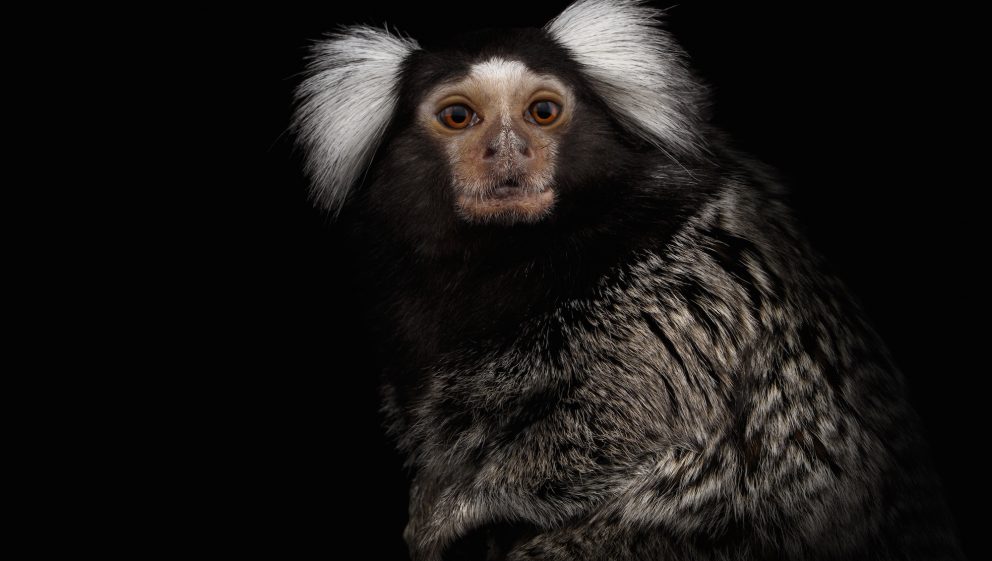The abuse of animals in laboratory experiments is a blot on humanity. This is true of all experiments, irrespective of their aim. But there is something especially cruel and macabre about subjecting living, sentient creatures to warfare experiments involving nerve agents, munitions and potentially weaponisable diseases.
That’s why this World Day for Animals in Laboratories, on 24 April, campaign group Animal Aid is highlighting British military research using live animals.
The most notorious establishment conducting these experiments is the Defence Science and Technology Laboratory (Dstl) at Porton Down, the top-secret government research facility. From 2010 to 2019, a total of 52,085 animals were used there. The nightmarish experiments involved procedures like those below:
- Guinea pigs had a toxic nerve agent applied to their backs and were then observed for symptoms including ‘no meaningful voluntary movement’, ‘gasping’, ‘continuous tremor’ and ‘writhing.’
- Marmosets were exposed to Ebola on the grounds that Ebola viruses were ‘considered possible biowarfare / bioterrorist agents.’ A report noted that the animals suffered ‘altered respiration, subdued nature, and reluctance to move, eat or drink. External hemorrhaging from the genitals was observed in 4 animals’.
Animals are routinely put to death after serving their purpose. Proponents of Dstl’s experiments excuse the death toll by explaining that it is ‘less than 0.5% of the national total.’ However, Animal Aid has revealed that whilst in 2018 the national average for ‘severe’ procedures (the highest level of pain and suffering permitted) was 4.9%, at Dstl it was 30.2%.
Animal Aid also recently exposed an experiment at the University of Birmingham, supported by the Ministry of Defence, which involved anaesthetised rats being shot in the eyes with plastic pellets, injected in the eyeballs and then killed two weeks later. Despite potentially excruciating injuries, there is no mention in the official papers that the rats were given post-procedure pain-killers in the two weeks prior to their euthanisation. (Since we highlighted this experiment, an Animal Aid supporter who contacted Dstl, Porton Down, has been informed that pain relief was given to the animals and the injections were administered under a general anaesthetic.)
All Dstl animal experiments are licensed and the guidance surrounding them states that:
‘Project licences will not be granted for programmes of work involving… developing or testing offensive weapons (but we may consider licences for developing and testing ways of protecting or treating service men and women, or the population as a whole).’
This caveat is a get out clause that is used to legitimise much of the research at Dstl Porton Down.
For the animals involved, whether the research is for offensive or defensive weapons, or to develop treatments for weapon injuries, the consequences are much the same. They are caged in tiny spaces, deprived of their natural habitat and the freedom to roam, and can be isolated without mates or social interaction. Even animals used for protective research often endure gruesome procedures involving harmful, noxious substances like nerve and biological agents and are then usually killed.
The UK government argues that we ‘need’ these experiments because there are no alternatives. It confirms that our military medical personnel, the Defence Medical Services (DMS), undergo battlefield injury training using live animals:
‘Up to twice a year, members of the DMS attend surgical training exercises in Denmark, during which live but fully anaesthetised pigs are given bullet and blast wounds which are then treated in real-time exercises by surgical teams.’
However, a survey of the 28 NATO member states revealed that very few still use live animals in military or special operations training.
Why does the UK government persist in the mistaken belief that animals are the gold standard for training in the treatment of battlefield injuries, when other countries are using alternatives?
For all these reasons, Animal Aid is calling for a ban on warfare experiments using live animals. It is signing up MPs to urge the Government Minister with portfolio for animal-based research, Baroness Williams of Trafford, to make them illegal.
Wouldn’t it be wonderful this World Day for Animals in Laboratories if the human animals in our government took the bold ethical step of ending the abuse of non-human animals by the British armed forces and military research establishments? Over to you Minister.


